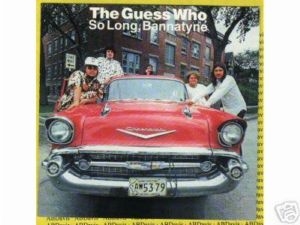
- Format: MP3

In March of 1971, the Guess Who recorded the follow-up to their rare 45 RPM "Hang On to Your Life" (rare because it was the remix with additional guitars not found on the version on The Best of the Guess Who). This follow-up, a double-sided single that would lead off The Best of the Guess Who, Vol. 2 was the Top 30 "Albert Flasher" with its airplay hit B-side, "Broken." Both songs would have fit nicely on this album, which was recorded four months later. The upside of the album is that its sound closely repeats that of the Share the Land disc, an album which itself was up there with American Woman. The downside is that in stretching their music beyond what they were known for, tunes like "One Man Army" or the annoying "Fiddlin'," the ensemble moves away from those things which made it so radio friendly. Yes, there is a Top 20 hit in "Rain Dance," the last one before "Star Baby" would touch the outer reaches of the Top 40 almost three years later, and a couple of near misses, "Sour Suite" and "Life in the Bloodstream," both Burton Cummings compositions which were included on The Best of the Guess Who, Vol. 2, but the artistic free hand misses whatever musical tension was going on between Randy Bachman and Burton, and the excesses are beginning to become evident. "Sour Suite" labors on the Indianapolis zip code, 46201, not very poetic, and "where'd you get that gun, John?" in "Rain Dance" really does drive one bonkers after a few spins. Even the '50s-ish "Life in the Bloodstream," like the two songs just referenced, suffers from a throwaway line. But "Goin' a Little Crazy" pays attention; its serious drama makes it one of the better numbers, along with "She Might Have Been a Nice Girl" and the title track. Play "So Long, Bannatyne" next to Burton Cummings' rendition of "You Ain't Seen Nothing Yet" off of his 1976 solo debut to hear how Richard Perry's production contrasts with Jack Richardson's work here. Richardson was as much a part of the sound as the band, and all the post-Bachman albums are very uniform, in a good way, because of it. The directness of a "Hand Me Down World" or no nonsense of "American Woman" is replaced by artsy noodling. A solid moment like "Pain Train" is followed by the piano roll sound of "One Divided," working better than the politically incorrect "One Man Army," which would have been a good song without the questionable dialogue. The packaging with color photos and lyrics on the inner sleeve are as elaborate as the jazz overtones on Greg Leskiw's "Grey Day," but at the end of the day, the "Albert Flasher"/"Broken" single contains all the elements this album and some of those which followed forgot.